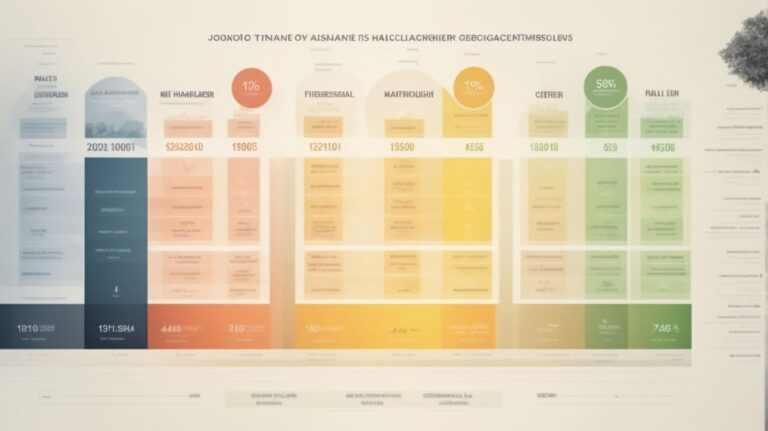Industrial-Organizational Psychology is a fascinating field that encompasses various specialty areas, each with its own unique focus and challenges. From employee selection and placement to workplace health and wellness, this discipline plays a crucial role in shaping the dynamics of organizations.
In this article, we will delve into the key responsibilities of an Industrial-Organizational Psychologist, the skills required for a career in this field, as well as the educational and training requirements.
We will also explore the job outlook and provide insights into how one can pursue a rewarding career in Industrial-Organizational Psychology.
Contents
- 1 Key Takeaways:
- 2 What is Industrial-Organizational Psychology?
- 3 What are the Specialty Areas in Industrial-Organizational Psychology?
- 4 What are the Key Responsibilities of an Industrial-Organizational Psychologist?
- 5 What are the Skills Required for a Career in Industrial-Organizational Psychology?
- 6 What are the Educational and Training Requirements for Industrial-Organizational Psychologists?
- 7 What is the Job Outlook for Industrial-Organizational Psychologists?
- 8 How Can Someone Pursue a Career in Industrial-Organizational Psychology?
- 9 Frequently Asked Questions
- 9.1 What is Industrial-Organizational Psychology?
- 9.2 What are some common specialty areas in Industrial-Organizational Psychology?
- 9.3 How can exploring specialty areas in Industrial-Organizational Psychology benefit my career?
- 9.4 What are some current trends and challenges in the field of Industrial-Organizational Psychology?
- 9.5 How do I determine which specialty area within Industrial-Organizational Psychology is right for me?
- 9.6 What are some potential job roles in specialty areas of Industrial-Organizational Psychology?
Key Takeaways:
- Industrial-Organizational Psychology applies psychological principles to the workplace to improve employee well-being and organizational effectiveness.
- Specialty areas in I-O Psychology include employee selection, training and development, performance management, and diversity and inclusion.
- The key responsibilities of an I-O Psychologist include conducting research, developing and implementing strategies, and providing consultation and training services.
What is Industrial-Organizational Psychology?
Industrial-Organizational (I-O) psychology is a specialized field within psychology that focuses on applying psychological theories and principles to organizations and the workplace.
This discipline encompasses a wide range of practices, including talent management, employee assessment, training and development, leadership development, and work-life balance initiatives.
I-O psychologists play crucial roles in addressing various organizational and workforce-related challenges, such as improving productivity, enhancing job satisfaction, reducing workplace stress, and fostering effective communication and teamwork.
Their expertise is applied in diverse industries, governmental agencies, consulting firms, and academic institutions. They leverage their knowledge in data analysis, research methodologies, and human behavior to develop strategies that promote organizational effectiveness and employee well-being.
What are the Specialty Areas in Industrial-Organizational Psychology?
Industrial-Organizational Psychology encompasses a range of specialty areas that focus on different aspects of organizational behavior and workforce dynamics.
It includes employee selection and placement, training and development, performance management, organizational development, work-life balance, leadership development, diversity and inclusion, workplace health and wellness, talent management, and change management.
Employee Selection and Placement
Employee selection and placement in I-O psychology involves the development and implementation of effective strategies for identifying and placing the right individuals in appropriate job roles within organizations.
This process is crucial for the success of an organization, as it directly impacts workforce dynamics such as productivity, job satisfaction, and overall performance.
Recruitment plays a pivotal role in this process, as it involves attracting and sourcing potential candidates through various channels, including job postings, referrals, and networking.
Once a pool of candidates is established, assessments are utilized to evaluate their skills, knowledge, and potential fit within the organization. These assessments may include psychometric tests, interviews, and work samples to gauge the candidate’s abilities and potential for job success.
Job matching is another essential component, as it focuses on aligning the candidate’s strengths, interests, and values with the specific job requirements.
Placement strategies, such as onboarding and orientation programs, are then implemented to ensure a smooth transition and integration of the selected candidates into their new roles.
Training and Development
Training and development in I-O psychology focuses on designing and implementing programs to enhance the skills, knowledge, and capabilities of employees within organizational settings.
This process typically begins with a comprehensive needs assessment, which involves identifying the skill gaps and areas for improvement within the workforce.
Once the needs are identified, the program design phase comes into play. This involves creating tailor-made learning modules, workshops, and resources to address the identified needs.
Implementation strategies then focus on effective delivery methods, such as workshops, mentoring, e-learning, and on-the-job training.
Ultimately, the impact of such programs on career advancement and overall organizational performance is a crucial aspect to consider, as it influences the success of the training and development initiatives.
Performance Management
Performance management within I-O psychology involves the systematic assessment, analysis, and enhancement of individual and organizational performance to optimize productivity and effectiveness.
This process often incorporates appraisal systems to evaluate employee performance, feedback mechanisms for ongoing improvement, and performance analysis to identify areas for development.
By integrating these components, organizations can cultivate a culture of continuous learning and improvement that positively impacts organizational productivity.
Performance management has significant career development implications for employees, as it can provide them with clear objectives, feedback, and support for their professional growth.
Organizational Development
Organizational development in I-O psychology focuses on fostering positive change, growth, and effectiveness within organizational structures, processes, and cultures.
This involves implementing change management processes to enhance the flexibility and adaptability of organizations, creating a culture of continuous improvement and innovation.
It encompasses cultural transformation by addressing values, behaviors, and communication patterns to align with the strategic objectives and vision of the organization.
Within industry-specific growth strategies, organizational development plays a crucial role in identifying and capitalizing on emerging trends, technological advancements, and market opportunities to ensure sustainable business expansion and competitive advantage.
Work-Life Balance
Work-life balance considerations in I-O psychology aim to address the challenges and opportunities associated with harmonizing professional responsibilities and personal well-being for employees within organizations.
Organizations have implemented various policies and interventions to promote work-life balance among their employees. These can include flexible working hours, remote work options, and parental leave policies.
Creating a supportive organizational culture that values work-life balance can lead to improved employee satisfaction and retention rates. Studies have shown that employees who feel their organization supports their work-life balance are generally more productive and have lower levels of stress.
Leadership Development
Leadership development within I-O psychology focuses on enhancing the capabilities, effectiveness, and impact of individuals in leadership roles within organizational contexts.
These initiatives often involve training programs designed to build essential skills such as strategic thinking, decision-making, communication, and team management.
Additionally, succession planning plays a vital role in identifying and grooming future leaders, ensuring a seamless transition of leadership within organizations.
The revenue impact of effective leadership development cannot be overlooked, as skilled and well-equipped leaders are likely to drive business growth and positive organizational outcomes.
Through targeted interventions and leadership development programs, I-O psychology plays a crucial role in nurturing and shaping the leaders of tomorrow.
Diversity and Inclusion
Diversity and inclusion initiatives within I-O psychology aim to create equitable, inclusive, and diverse work environments that leverage the unique strengths and perspectives of all employees.
These initiatives not only foster a more welcoming and supportive atmosphere for employees from various backgrounds, but also lead to improved organizational performance, enhanced creativity, and better decision-making.
By embracing diversity and inclusion, organizations can tap into a wider talent pool, resulting in a more dynamic and innovative workforce.
Implementing strategies such as diversity training, mentorship programs, and diverse recruitment efforts can aid in creating an environment where every individual feels valued and enabled.
Workplace Health and Wellness
Workplace health and wellness initiatives in I-O psychology focus on promoting physical, mental, and emotional well-being for employees within organizational settings.
These initiatives encompass various components that aim to create a supportive and healthy work environment.
Program design is a crucial aspect, involving the development of comprehensive health and wellness programs that address the diverse needs of the workforce.
Additionally, management support plays a vital role, as leadership commitment and involvement are essential in driving the success of such initiatives.
Talent Management
Talent management strategies within I-O psychology focus on identifying, developing, and retaining top talent to meet organizational needs and drive sustainable success.
In the context of recruitment, companies utilize recruitment strategies to attract a diverse pool of candidates. This involves leveraging channels such as job portals, social media, and employee referrals.
Once talent is onboard, career development programs become pivotal in nurturing their skills. These programs provide training, mentorship, and advancement opportunities to help employees grow and succeed in their roles.
Additionally, employee retention efforts are crucial in maintaining a motivated and engaged workforce. This can be achieved through competitive compensation, benefits, and creating a positive work environment.
Change Management
Change management efforts in I-O psychology focus on facilitating successful transitions, adoptions, and integrations within organizational contexts, considering geographic and industry-specific factors.
Organizational assessments play a crucial role in change management, providing a comprehensive understanding of the current state, identifying areas for improvement, and establishing a baseline for progress measurement.
Consultants in this field assume diverse roles, from change catalyst to process facilitator, guiding organizations through the intricacies of change.
Industry-specific adaptations involve tailoring change strategies to align with unique market challenges and regulatory frameworks, recognizing that a one-size-fits-all approach may not yield optimal results.
What are the Key Responsibilities of an Industrial-Organizational Psychologist?
Industrial-Organizational Psychologists have diverse responsibilities that include conducting research, applying psychological principles to improve workplace environments, collaborating with management, and advising on human resources-related matters.
They are actively involved in the study of behavior in organizational settings, utilizing their expertise to address issues such as productivity, morale, and employee management.
I-O psychologists also play a pivotal role in designing and implementing employee training programs and skill assessment tools.
They provide consultation to organizations on various areas, including talent acquisition, leadership development, and organizational change management.
What are the Skills Required for a Career in Industrial-Organizational Psychology?
A successful career in Industrial-Organizational Psychology requires a blend of analytical, interpersonal, research, and problem-solving skills, coupled with a solid understanding of behavioral dynamics in work environments.
Professionals in this field need strong analytical abilities to interpret data, assess organizational needs, and formulate effective strategies.
Additionally, interpersonal competencies are crucial for collaborating with diverse teams, understanding individual differences, and facilitating organizational change.
A robust academic background in psychology, human resources, or organizational behavior is essential for developing expertise in research methodologies, psychological assessment, and organizational development theories.
Grasping the nuances of varied work environments, such as corporate, government, or consulting settings, provides practical insight into applying psychological principles to address workplace challenges.
What are the Educational and Training Requirements for Industrial-Organizational Psychologists?
Becoming an Industrial-Organizational Psychologist typically necessitates a graduate degree in psychology or a related field, accompanied by specialized training in research methods, organizational behavior, and professional development strategies.
Aspiring I-O psychologists often pursue master’s or doctoral programs that offer coursework in industrial-organizational psychology, psychological research methodologies, statistical analysis, and advanced organizational theory.
These programs provide students with in-depth knowledge of psychological principles as they relate to the workplace, equipping them with the skills necessary to analyze and address complex organizational issues.
Aspiring professionals may engage in fieldwork, internships, or practical experiences to gain hands-on exposure to real-world organizational challenges and refine their problem-solving capabilities.
What is the Job Outlook for Industrial-Organizational Psychologists?
The job outlook for Industrial-Organizational Psychologists is promising, with a projected growth in demand fueled by the increasing focus on workplace productivity, organizational effectiveness, and talent management across various industries and geographic regions.
According to the U.S. Bureau of Labor Statistics, the employment of Industrial-Organizational Psychologists is projected to grow much faster than the average for all occupations, at a rate of 12% from 2020 to 2030.
This demand is driven by the need for organizations to enhance worker productivity, retain valuable employees, and address issues related to diversity and inclusion.
Industries such as healthcare, consulting, and tech are expected to show particularly strong demand for the application of psychological principles in the workplace.
Geographically, areas with a high concentration of businesses and corporations, such as major urban centers, are likely to offer the most opportunities for Industrial-Organizational Psychologists, while the public sector and academia also present potential avenues for employment and consulting.
How Can Someone Pursue a Career in Industrial-Organizational Psychology?
Individuals aspiring to pursue a career in Industrial-Organizational Psychology can explore diverse opportunities in consulting firms, human resources departments, research institutions, and academic settings, with the potential for competitive salaries and professional growth.
Professionals in this field can find positions such as organizational consultant where they apply psychological principles to enhance workplace productivity and employee satisfaction.
Alternatively, they may work within human resources, specializing in employee assessment and talent management.
For those interested in research, opportunities exist in academia and research institutions, often involving conducting studies on workplace behavior and organizational dynamics to contribute to the body of knowledge in this discipline.
Regarding educational pathways, aspiring I-O psychologists typically pursue a master’s or doctoral degree in this field, with coursework encompassing psychological assessment, statistics, and organizational development.
Frequently Asked Questions
What is Industrial-Organizational Psychology?
Industrial-Organizational Psychology, also known as I-O Psychology, is the scientific study of human behavior in the workplace. It applies psychological principles and theories to improve the well-being and productivity of individuals, teams, and organizations.
What are some common specialty areas in Industrial-Organizational Psychology?
Some common specialty areas in I-O Psychology include employee recruitment and selection, training and development, performance management, workplace diversity and inclusion, and organizational development and change.
How can exploring specialty areas in Industrial-Organizational Psychology benefit my career?
Exploring specialty areas in I-O Psychology can help you gain a deeper understanding of different aspects of the workplace and develop specialized skills that can make you a valuable asset in the job market. It can also help you find a niche that aligns with your interests and strengths.
What are some current trends and challenges in the field of Industrial-Organizational Psychology?
Some current trends in I-O Psychology include the use of technology in employee assessments, the focus on work-life balance and employee well-being, and the increasing importance of virtual teams and remote work.
Some challenges include managing diverse workforces, addressing issues of workplace discrimination and harassment, and adapting to the ever-changing nature of the modern workplace.
How do I determine which specialty area within Industrial-Organizational Psychology is right for me?
It is important to consider your interests, strengths, and career goals when exploring specialty areas in I-O Psychology. You can also talk to professionals in the field, attend conferences and workshops, and explore different courses and certifications to gain more insight into different specialty areas.
What are some potential job roles in specialty areas of Industrial-Organizational Psychology?
Some potential job roles in specialty areas of I-O Psychology include human resources manager, training and development specialist, organizational development consultant, diversity and inclusion specialist, and talent acquisition specialist.






